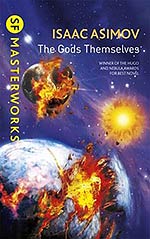
![]() Tar Daddoo
Tar Daddoo
4/8/2013
![]()
What is the Science Fiction Premise?
At the heart of The Gods Themselves is the notion of parallel universes with differing physical constants. Given a point at which the two universes can interact, it becomes possible for both universes to obtain energy from the other in a seemingly endless supply.
Is the science of the premise explored?
There are detailed descriptions of the physics involved in passing energy between the universes. I could not follow all the details, but they certainly seemed sensible. I'm not sure there was an equally plausible discussion of how the universes might ever be able to interact. This is simply one of those things you accept early on for the sake of the story.
Is the impact of the premise on an individual explored?
There is some discussion of how the Science Fiction premise has changed some lives, but these changes result more from everyday human concerns than from the premise itself. The situation is a bit different for the creatures in the other universe; some of their choices are driven by the Science Fiction premise. Even here, however, the premise is being used to reveal their lives more than it is being used to reveal changes in their lives.
Is the impact of the premise on society explored?
A key aspect of The Gods Themselves is that society cannot easily turn its back on seemingly free energy. In this way, it is a straightforward allegory for the concerns about fossil fuel use. Published in 1972, the OPEC oil embargo and consequent oil crisis was still a year away. Barry Commoner's book, The Poverty of Power, would not be published until 1976. Concerns about ozone depletion were just beginning to emerge in scientific circles.
In The Gods Themselves, Asimov is not so much prescient about our present challenges as clear-eyed about the ways in which science is distorted and misinterpreted to ensure that the good times may continue. The title is taken from a play by Friedrich Schiller, The Maid of Orleans (1801), in which one of the characters says, "Against stupidity the gods themselves contend in vain." This warning bodes ill for the mere mortals who struggle throughout the book to alert humanity to the danger it faces.
How well written is the story?
As usual, Asimov's writing is smooth and well-paced. It is not overly long or drawn out.
Having said that, I did find the structure of the book somewhat odd. It unfolds in three parts with the first laying out the premise and the challenge it poses. In the second part, we shift to the parallel universe to see things from the other side. Then, we return to our universe to confront the challenge from a base on the moon.
I found the first part a delight to read, but it had the advantage of laying out the basic idea. The second part was also enjoyable, but for the wrong reason. Asimov's portrayal of completely alien beings and their society is fun, but very little of it is critical to advancing the larger story. Then, when we return to our universe we find ourselves on the moon, learning about how it works, about moon-oriented political intrigues, and about a friendship between a middle-aged man and a younger woman. As with the aliens' story, these threads are only lightly tied into the major story.
Since the first section can not really stand on its own, where the other two almost could, it would appear that Asimov had some interesting ideas about an alien society and some interesting ideas about establishing a presence on the moon and used the energy premise to tie it all together. It works mostly, but it is hard to call it excellent novel writing.
Can I recommend the book?
If you have never read Asimov, start somewhere else. The Foundation Trilogy or the robot stories -- starting with I, Robot -- come readily to mind.
If you know and love Asimov (as I do), you will definitely want to read The Gods Themselves to round out your knowledge of his writing. As I said, the book is easy to read and you might really enjoy the physics or the various sub-plots.
For everyone else, while I won't warn you away, I would caution you to enjoy it in pieces and not expect a tightly-integrated plot.
Tar Daddoo